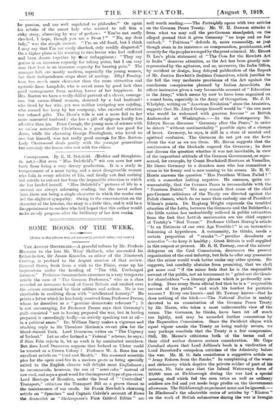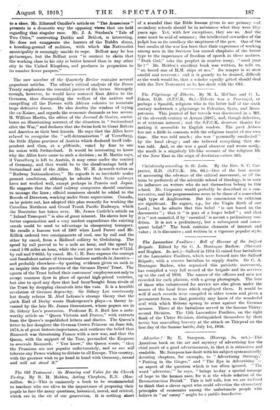SOME BOOKS OF THE WEEK.
[Notice in this column does not necessarily preclude subze:gent retiew.]
THE AUGUST MONTHLIES.—A graceful tribute by Mr. Frederic Harrison to the late Mr. Wray Skilbeck, who succeeded his father-in-law, Sir James Knowles, as editor of the Nineteenth Century, is prefixed te the August number of that review. General Stone, fresh from a visit to the Rhine, sums up his impressions under the heading of The Old, Unchanged German." Professor Sonnenschein examines in a very temperate article the case of "The German Professors," who as a class revealed an insensate hatred of Great Britain and exulted over the crimes committed by their soldiers and sailors. He is too charitable in crediting them with "intellectual honesty." He prints a letter which he has lately received from Professor Preuss, whom he describes as a. "genuine democratic reformer " ; it is not encouraging, for Professor Preuss says that Germany's guilt consisted "not in having prepared the war, but in having prepared it exceedingly badly—or strictly speaking not at all— in a political sense." Dr. William Barry makes a vigorous and crushing reply to Sir Theodore Morison's recent plea for the blood-stained Turk. Lord Druaraven writes on "The Urgency of Ireland." Let us offer Ireland a " Federal " scheme, he says ; if Sinn Fein rejects it, let us work it by nominated members. But does Lord Dunraven suppose that Ireland or Ulster could be treated as a Crown Colony ? Professor W. A. Bone has an excellent article on "Coal and Health." His reasoned scientific plea for the open coal-fire in a modern grate as being specially suited to the English climate will delight most Englishmen ; he recommends, however, the use of " semi-coke " instead of raw coal, and says a good word for the improved type of gas-stove. Lord Montagu of Beaulieu, under the head of " Controlled ' Transport," criticizes the Transport Bill as a grave threat to the maintenance of our roads, Sir Frank Newbolt's charming article on " Speeches " and Captain Colvile's account of Rowe the dramatist as "Shakespeare's First Critical Editor" are well worth reading.—The Fortnightly opens with two articles on the German Peace Treaty. Mr. W. H. Dawson attacks it from what we may call the pro-German standpoint, on the alleged ground that it gives Germany "no hope and no fair outlook." " Politicus " defends it, more reasonably, as jut though stern in its insistence on compensation, punishment, and security for the peoples wronged by the great criminal. Mr. Ernest D. Lee's plain statement of "The Case for the Rowlett Act in India" deserves attention, as the Act has been grossly misrepresented by the agitators, and as, moreover, the India Office, by accident or design, long delayed publication of the Report of Mr. Justice Rowlatt's Sedition Committee, whir& justifies to the full the very moderate provisions of the Act against the murderous conspiracies planned by Indian Anarchists. An officer instructor gives a very favourable account of "Education in the Army," which seems by now to have been organized on a sound basis, especially in the Army of Occupation. Mr. J. Whelpley, writing on "American Evolution" since the Armistice, suggests that Mr. Lloyd George himself would be "the one man who would be welcomed with greatest fervour" as British Ambassador at Washington.—In the Contemporary Mr. Edwyn Bevan discusses "Germany after the Peace," in order to detect "without sentimentality" possible signs of a change of heart. Germany, he says, is still in a state of mental and spiritual confusion. The Germans do not yet see the facts about the war as we see them. Mr. Bevan suggests that the continuance of the blockade angered the Germans ; he does not discuss the question whether it was not inevitable, in view of the impenitent attitude of the German Government, as represented, for examples by Count Brockdorff-Rantzau at Versailles. He likens Germany to a drunken man who has committed a crime in his frenzy and is now coming to his senses. Mr. H. W. Harris answers the question "Has President Wilson Failed?" with a somewhat halting negative. He assumes, quite unwarrantably, that the German Peace is irreconcilable with the "Fourteen Points." We may remark that some of the chief pro-German criticisms of the Treaty are directed against the Polish clauses, which do no more than embody one of President Wilson's points. Dr. Hagberg Wright expounds the troubled situation of the Letts, between the Germans and the Bolsheviks ; the little nation has undoubtedly suffered in public estimation from the fact that Lettish mercenaries are the chief support of Trotsky's "Red Terror." Professor Gilbert Murray's article "Is an Estimate of our own Age Possible ?" is an instructive balancing of hypotheses. A community, he thinks, needs a certain proportion of "cranks "—" peculiar decedents or neurotics "—to keep it healthy ; Great Britain is well supplied in this respect at present. Mr. R. H. Tawney, one of the miners' delegates on the Coal Commission, denounces the present organization of the coal industry, but fails to offer any guarantee that the miner would work better under any other system. He suggests, but carefully abstains from promising, that we shall get more coal "if the miner feels that he is the responsible servant of the public, not an instrument to "grind out dividends for shareholders "—a literary phrase which is profoundly misleading. Does every State official feel that he is a "responsible servant of the public" and work his hardest for patriotic reasons ? Every one knows—and Mr. Tawney. knows—that he does nothing of the kind.—The National Review is mainly devoted to an examination of the German Peace Treaty by Mr. Masse, who takes a most unfavourable view of the terms. The Germans, he thinks, have been let off much too lightly, and may be accorded further concessions by the Reparation Commission. Since the Pacificist clique with equal vigour assails the Treaty as being unduly severe, we may perhaps conclude that the Treaty is a fair compromise. Still, Mr. Maxse's criticisms both of the terms and of their chief author deserve serious consideration. Mr. Cope .Cornford shows that Lord Jellicoe's book is a vindication of Lord Beresford's outspoken criticism of the Admiralty before the war. Mr. M. 0. Sale contributes a suggestive article on "Army Reform from the Ranks." In complaining of the waste and dishonesty which deprive the private soldier of part of his rations, Mr. Sale says that the Inland Waterways force of 20,000 men at Richborough during the war had a special messing staff which fed, the men twice as well as ordinary soldiers are fed and yet made large profits on the Government allowance. The Richborough experiment must not be Ignored.— In Blackwood's the admirable series of articles by " Klaxon " on the work of British submarinesduring the war is brought
In a close. Mr. Edmund Claudler's article on "The Armenians" presents in a dramatic way the opposing views that are held regarding that singular race. Mr. J. A. Strahan's "Tale -of Two Cities," contrasting Dublin and Belfast,, is interesting. He does not exaggerate the horrors of the Dublin slums, a breeding-ground of sedition, with which the Nationalist municipality is seemingly unable to cope. Belfast may be less picturesque, but the Belfast man "is content to claim that the working class in his city is better housed than in any other city in the United Kingdom, and produces in proportion to its number fewer paupers."



































 Previous page
Previous page